Unit 2 I'll help to clean up the city parks. Section A (GF-4c) 课件(共35张PPT)
文档属性
| 名称 | Unit 2 I'll help to clean up the city parks. Section A (GF-4c) 课件(共35张PPT) | 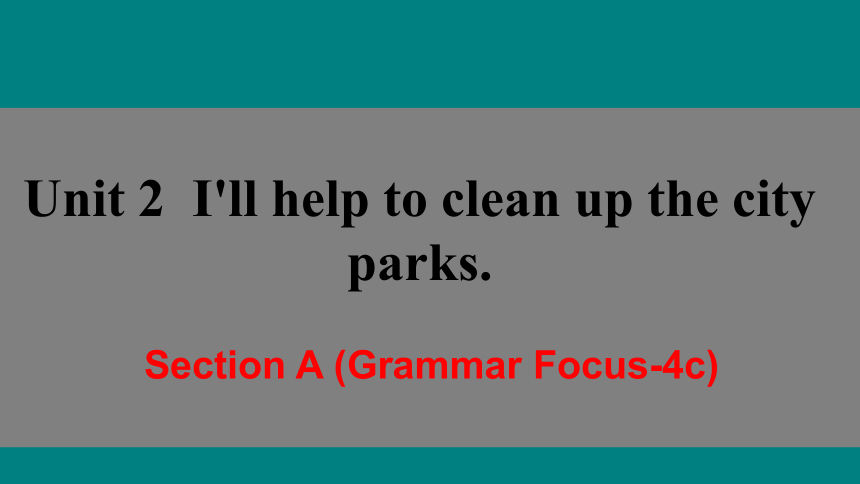 | |
| 格式 | pptx | ||
| 文件大小 | 1.1MB | ||
| 资源类型 | 教案 | ||
| 版本资源 | 人教新目标(Go for it)版 | ||
| 科目 | 英语 | ||
| 更新时间 | 2021-12-14 20:53:37 | ||
图片预览

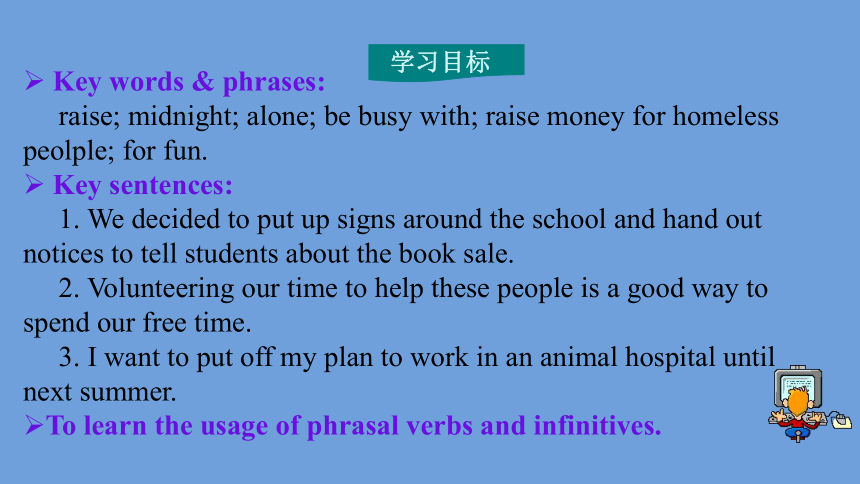
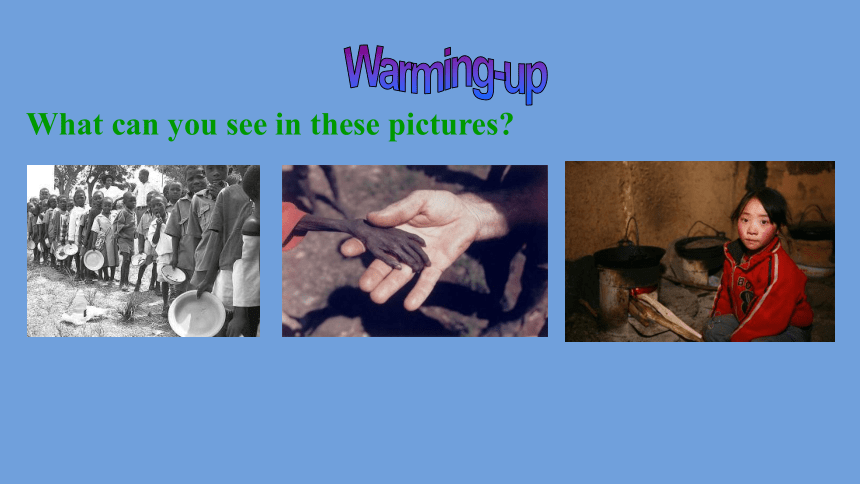

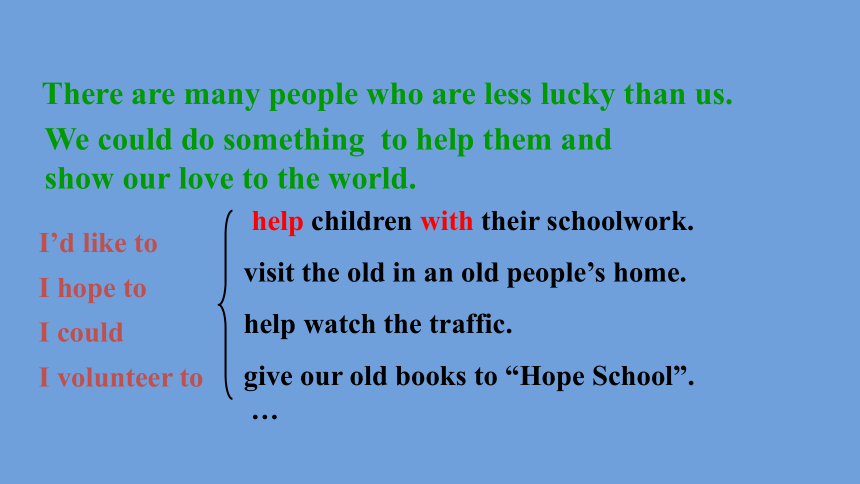
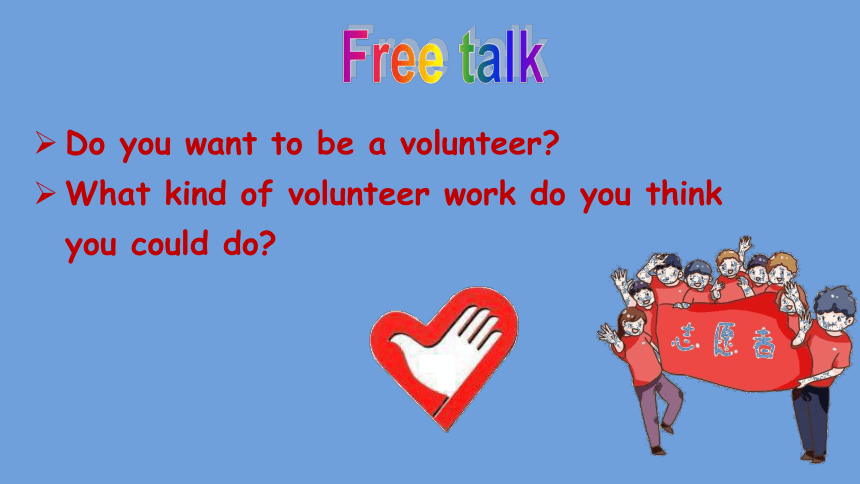
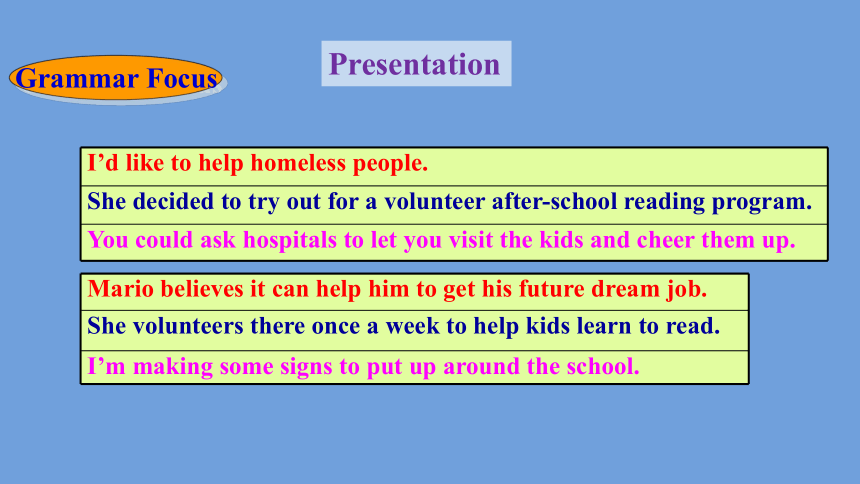
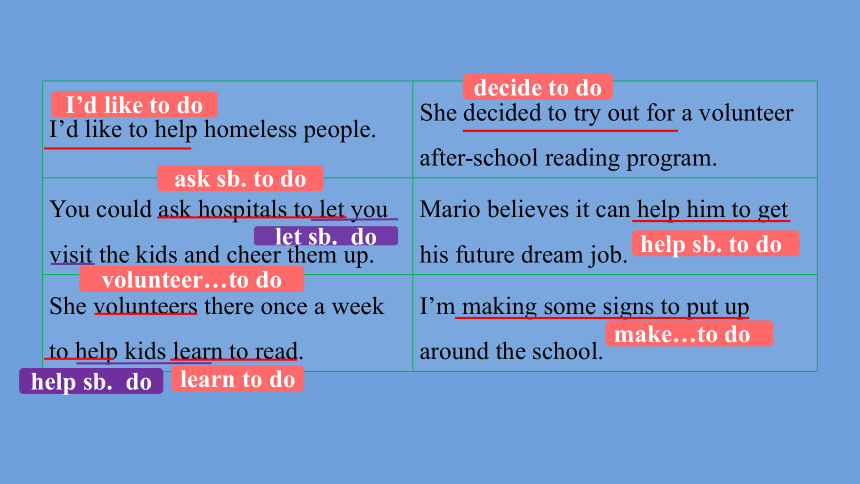
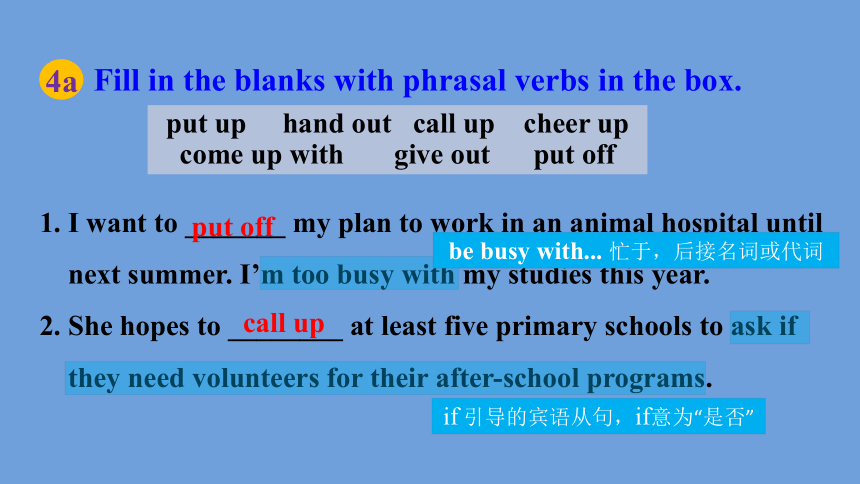
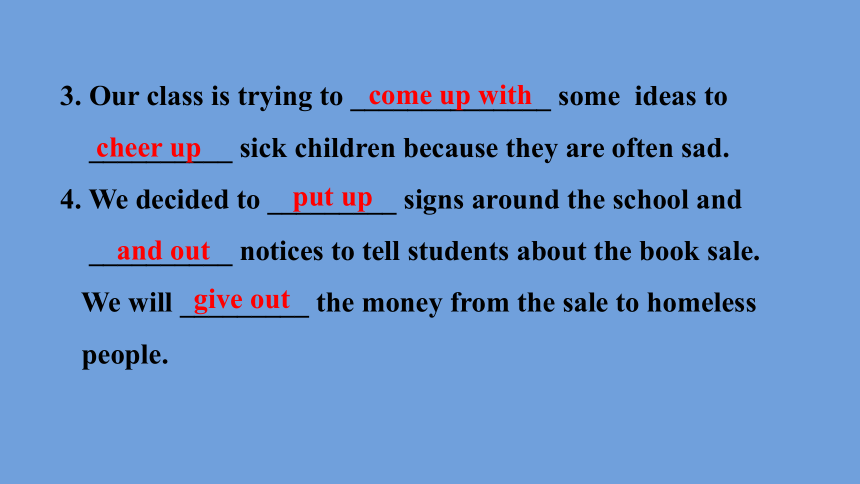
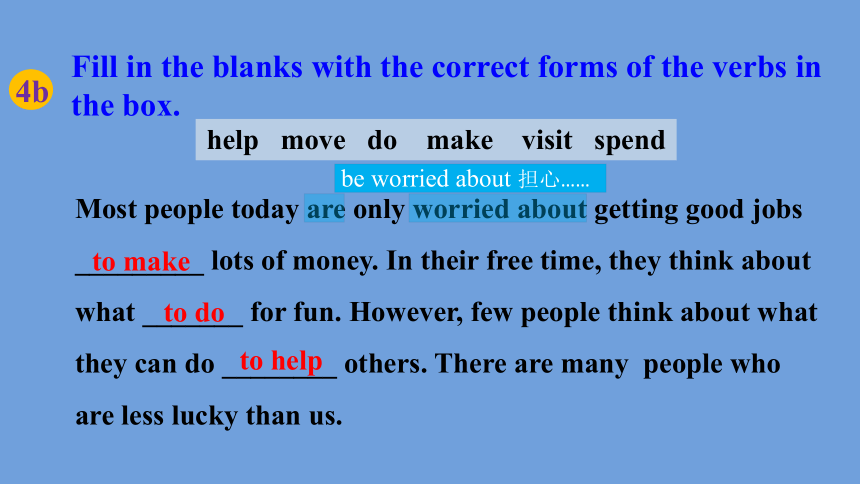
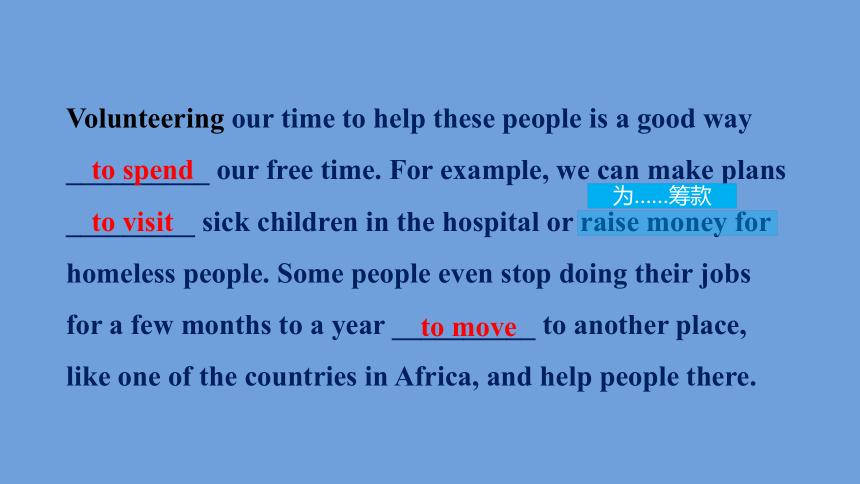
文档简介
(共35张PPT)
Section A (Grammar Focus-4c)
Unit 2 I'll help to clean up the city parks.
学习目标
Key words & phrases:
raise; midnight; alone; be busy with; raise money for homeless peolple; for fun.
Key sentences:
1. We decided to put up signs around the school and hand out notices to tell students about the book sale.
2. Volunteering our time to help these people is a good way to spend our free time.
3. I want to put off my plan to work in an animal hospital until next summer.
To learn the usage of phrasal verbs and infinitives.
Warming-up
What can you see in these pictures
There are many people who are less lucky than us.
We could do something to help them and show our love to the world.
help children with their schoolwork.
visit the old in an old people’s home.
help watch the traffic.
give our old books to “Hope School”.
…
I’d like to
I hope to
I could
I volunteer to
Free talk
Do you want to be a volunteer
What kind of volunteer work do you think you could do
Presentation
Grammar Focus
I’d like to help homeless people.
She decided to try out for a volunteer after-school reading program.
You could ask hospitals to let you visit the kids and cheer them up.
Mario believes it can help him to get his future dream job.
She volunteers there once a week to help kids learn to read.
I’m making some signs to put up around the school.
I’d like to help homeless people. She decided to try out for a volunteer after-school reading program.
You could ask hospitals to let you visit the kids and cheer them up. Mario believes it can help him to get his future dream job.
She volunteers there once a week to help kids learn to read. I’m making some signs to put up around the school.
I’d like to do
ask sb. to do
volunteer…to do
learn to do
decide to do
help sb. to do
make…to do
let sb. do
help sb. do
4a
put up hand out call up cheer up
come up with give out put off
Fill in the blanks with phrasal verbs in the box.
1. I want to _______ my plan to work in an animal hospital until
next summer. I’m too busy with my studies this year.
2. She hopes to ________ at least five primary schools to ask if
they need volunteers for their after-school programs.
put off
call up
be busy with... 忙于,后接名词或代词
if 引导的宾语从句,if意为“是否”
3. Our class is trying to ______________ some ideas to
__________ sick children because they are often sad.
4. We decided to _________ signs around the school and
__________ notices to tell students about the book sale.
We will _________ the money from the sale to homeless
people.
come up with
cheer up
put up
and out
give out
4b
help move do make visit spend
Fill in the blanks with the correct forms of the verbs in the box.
Most people today are only worried about getting good jobs _________ lots of money. In their free time, they think about what _______ for fun. However, few people think about what they can do ________ others. There are many people who are less lucky than us.
to do
to help
to make
be worried about 担心……
Volunteering our time to help these people is a good way __________ our free time. For example, we can make plans _________ sick children in the hospital or raise money for homeless people. Some people even stop doing their jobs for a few months to a year __________ to another place, like one of the countries in Africa, and help people there.
to spend
to visit
to move
为……筹款
4c
Complete the sentences with your own ideas. Use infinitives.
1. I’d like to volunteer ____________________________________________________.
2. At 12:00 midnight, I called my friend ____________________________________________________.
3. I’m very busy but I could help ____________________________________________________.
at the food bank and help to give out food to the homeless
to ask him an important question
to come up with some ideas about the party games
4. Summer vacation is coming, and I want ______________________________________________________.
5. I want to travel alone. My parents told me (not) ______________________________________________________.
to visit my grandparents in the countryside
not to do that, because they think it's not safe
Grammar
短语动词(Phrasal verbs)
短语动词是由动词加介词、副词或其他词构成的固定词组或习语(idioms),其作用和动词差不多。有些短语动词相当于及物动词,有些则相当于不及物动词。
语法概述
短语动词的类型和用法
动词+介词
相当于及物动词,后面必须有宾语,且宾语只能位于介词之后。
look after 照顾 look at 看 care for 非常喜欢;照顾
think about 考虑 agree with 同意 wait for 等待
I agree with what you said.
He cared for her more than she realized.
短语动词的类型和用法
动词+副词
①可看作及物动词,名词作宾语时,可位于动词与副词之间或副词之后;代词作宾语时;只能位于动词与副词之间。
②有的也可看作不及物动词。
cheer up 振奋起来
clean up 打扫干净
give up 放弃
put off 推迟
take away 拿走
fix up 修理
turn down 调低;拒绝
turn up 出现;调高
This is a new word. You’d better look it up in the dictionary.
It’s too noisy. Please turn down the TV. =It’s too noisy. Please turn the TV down.
短语动词的类型和用法
动词+副词+介词
相当于及物动词, 宾语位于介词之后。
catch up with 赶上 come up with 想出
look forward to 期望 run out of 用完;耗尽
He worked hard to catch up with his classmates.
I’m looking forward to the weekend.
短语动词的类型和用法
动词+名词+介词
相当于及物动词,名词前可加形容词说明程度,宾语位于介词之后。
make fun of 取笑 make use of 利用 pay attention to 注意
take care of 照顾 make friends with 与······交朋友
It’s impolite to make fun of your classmate.
We could make better use of our resources.
短语动词的类型和用法
be+形容词+介词
相当于及物动词, 宾语位于介词之后。
be different from 与······不同 be famous for 因为······而出名
be busy with 忙于······ be similar to 与······相似
The girl is afraid of dogs.
China is famous for its long history.
动词不定式的基本形式是“to+动词原形”,有时to可省略。它没有人称和数的变化,在句中不能作谓语。其否定形式为“not to+动词原形”。
语法概述
动词不定式
常接动词不定式作宾语的动词有:
想要 拒绝 忘记 (want, refuse, forget)
需要 努力 学习 (need, try, learn)
选择 同意 帮助 (choose, agree, help)
希望 决定 开始 (hope/wish/expect, decide, begin/start)
Lily wants to find a job as an English teacher in Beijing.
He decided to help the homeless.
动词不定式作宾语
动词不定式的用法
常接动词不定式作宾补的动词有:
ask, tell, want, teach, wish, help, warn, invite, encourage 等可以构成“...sb. (not) to do sth.”结构的动词。
Sam asked me to help him.
The teacher always tells us not to swim in the river.
动词不定式作宾语补足语
动词不定式的用法
注意:
在let, make, see, watch, hear, feel, notice, have等感官听觉动词或使役动词后面作宾语补足语的动词, 其不定式一般要省略动词不定式符号“to”。
let / make / have + sb. +do sth.
e.g. Let the girl leave here now.
The boy made the baby cry.
see / watch / hear / notice / feel +sb.+do sth.
e.g. I often hear the girl sing in the next room.
动词不定式的用法
动词不定式作状语
1)作目的状语。强调动词不定式所表示的目的时,动
词不定式可用in order to或so as to +动词原形,so as
to不用于句首。
e.g. The bus stopped so as to pick up passengers.
2)作结果状语。
e.g. He woke up only to find everybody gone.
His grandma lived to see the liberation of China.
He is old enough to go to school.
3)在某些表示喜、怒、哀、乐等的形容词后作原因状语
e.g. I’m proud to have taken part in the competitions .
She was surprised to see him
They jumped for joy to hear the news.
动词不定式的用法
动词不定式作主语时,通常表示一个具体的、特定的行为,其谓语动词用单数形式。
To know oneself is difficult. 人能自知,实属不易。
动词不定式作主语
动词不定式作主语时,为避免句子头重脚轻,可以用it作形式主语,不定式做主语放在句末。
It's difficult to learn a foreign language.
动词不定式的用法
动词不定式作定语时通常要放在所修饰词之后。
Who was the first one to arrive
Would you like something to drink
动词不定式作定语
My duty is to look after the animals.
动词不定式作表语
Exercises
一、单项选择。
1. Our school has _____ a sign at the gate, saying “Greet your child
with a smile, not a mobile.”
A. put up B. put off C. put on D. put in
2. It’s not good for you to smoke so much. You’d better _____.
A. give up it B. give them up C. give it up D. give up them
3. My cousin volunteers in the Children’s Home. His job is to____
food and clothes.
A. sell out B. work out C. hand out D. find out
C
A
C
4. —Will Bob help me look after my pet dog when I’m away
—Of course. He won’t _____ your request. He loves animals a lot.
A. put down B. write down C. turn down D. take down
5. John didn’t get the job he wanted. Let’s go and _____.
A. turn him down B. call him back
C. cheer him up D. let him down
6. Mother asks me _____ English every morning.
A. read B. to read C. reading D. no read
C
C
B
7. Michael visits many websites _____ about Chinese culture.
A. learn B. learned C. to learn
8. —Please stay with me this weekend.
—I’m sorry, but my father and I planned _____ Beijing a long
time ago.
A. visit B. visiting C. to visit D. visited
9. —Julia, your mobile phone is ringing.
—Wait a minute. It’s dangerous _____ it while crossing the
street.
A. answering B. answer C. to answer
C
C
C
二、完成句子。
1. 他们帮助无家可归的人过上舒适的生活,帮助贫困的孩子上学。
They helped _______ _________ to live a comfortable life and the poor kids to go to school.
2. 每当我出门,我妈妈总是担心我的安全。
Whenever I go out, my mother is always ________ ______ my safety.
the homeless
worried about
3. 我们已经制订一个计划来完成这项工作。
We have made a plan ______ _______ the work.
4. 学好英语不容易。
It is not easy _____ _______ English well.
5. 我有点儿事要和你谈一谈。
I have something _____ ______ with you.
to finish
to talk
to learn
Homework
Preview the new words and phrases in Section B(1a-1e).
Do the exercises in students’ book.
Thank you!
Section A (Grammar Focus-4c)
Unit 2 I'll help to clean up the city parks.
学习目标
Key words & phrases:
raise; midnight; alone; be busy with; raise money for homeless peolple; for fun.
Key sentences:
1. We decided to put up signs around the school and hand out notices to tell students about the book sale.
2. Volunteering our time to help these people is a good way to spend our free time.
3. I want to put off my plan to work in an animal hospital until next summer.
To learn the usage of phrasal verbs and infinitives.
Warming-up
What can you see in these pictures
There are many people who are less lucky than us.
We could do something to help them and show our love to the world.
help children with their schoolwork.
visit the old in an old people’s home.
help watch the traffic.
give our old books to “Hope School”.
…
I’d like to
I hope to
I could
I volunteer to
Free talk
Do you want to be a volunteer
What kind of volunteer work do you think you could do
Presentation
Grammar Focus
I’d like to help homeless people.
She decided to try out for a volunteer after-school reading program.
You could ask hospitals to let you visit the kids and cheer them up.
Mario believes it can help him to get his future dream job.
She volunteers there once a week to help kids learn to read.
I’m making some signs to put up around the school.
I’d like to help homeless people. She decided to try out for a volunteer after-school reading program.
You could ask hospitals to let you visit the kids and cheer them up. Mario believes it can help him to get his future dream job.
She volunteers there once a week to help kids learn to read. I’m making some signs to put up around the school.
I’d like to do
ask sb. to do
volunteer…to do
learn to do
decide to do
help sb. to do
make…to do
let sb. do
help sb. do
4a
put up hand out call up cheer up
come up with give out put off
Fill in the blanks with phrasal verbs in the box.
1. I want to _______ my plan to work in an animal hospital until
next summer. I’m too busy with my studies this year.
2. She hopes to ________ at least five primary schools to ask if
they need volunteers for their after-school programs.
put off
call up
be busy with... 忙于,后接名词或代词
if 引导的宾语从句,if意为“是否”
3. Our class is trying to ______________ some ideas to
__________ sick children because they are often sad.
4. We decided to _________ signs around the school and
__________ notices to tell students about the book sale.
We will _________ the money from the sale to homeless
people.
come up with
cheer up
put up
and out
give out
4b
help move do make visit spend
Fill in the blanks with the correct forms of the verbs in the box.
Most people today are only worried about getting good jobs _________ lots of money. In their free time, they think about what _______ for fun. However, few people think about what they can do ________ others. There are many people who are less lucky than us.
to do
to help
to make
be worried about 担心……
Volunteering our time to help these people is a good way __________ our free time. For example, we can make plans _________ sick children in the hospital or raise money for homeless people. Some people even stop doing their jobs for a few months to a year __________ to another place, like one of the countries in Africa, and help people there.
to spend
to visit
to move
为……筹款
4c
Complete the sentences with your own ideas. Use infinitives.
1. I’d like to volunteer ____________________________________________________.
2. At 12:00 midnight, I called my friend ____________________________________________________.
3. I’m very busy but I could help ____________________________________________________.
at the food bank and help to give out food to the homeless
to ask him an important question
to come up with some ideas about the party games
4. Summer vacation is coming, and I want ______________________________________________________.
5. I want to travel alone. My parents told me (not) ______________________________________________________.
to visit my grandparents in the countryside
not to do that, because they think it's not safe
Grammar
短语动词(Phrasal verbs)
短语动词是由动词加介词、副词或其他词构成的固定词组或习语(idioms),其作用和动词差不多。有些短语动词相当于及物动词,有些则相当于不及物动词。
语法概述
短语动词的类型和用法
动词+介词
相当于及物动词,后面必须有宾语,且宾语只能位于介词之后。
look after 照顾 look at 看 care for 非常喜欢;照顾
think about 考虑 agree with 同意 wait for 等待
I agree with what you said.
He cared for her more than she realized.
短语动词的类型和用法
动词+副词
①可看作及物动词,名词作宾语时,可位于动词与副词之间或副词之后;代词作宾语时;只能位于动词与副词之间。
②有的也可看作不及物动词。
cheer up 振奋起来
clean up 打扫干净
give up 放弃
put off 推迟
take away 拿走
fix up 修理
turn down 调低;拒绝
turn up 出现;调高
This is a new word. You’d better look it up in the dictionary.
It’s too noisy. Please turn down the TV. =It’s too noisy. Please turn the TV down.
短语动词的类型和用法
动词+副词+介词
相当于及物动词, 宾语位于介词之后。
catch up with 赶上 come up with 想出
look forward to 期望 run out of 用完;耗尽
He worked hard to catch up with his classmates.
I’m looking forward to the weekend.
短语动词的类型和用法
动词+名词+介词
相当于及物动词,名词前可加形容词说明程度,宾语位于介词之后。
make fun of 取笑 make use of 利用 pay attention to 注意
take care of 照顾 make friends with 与······交朋友
It’s impolite to make fun of your classmate.
We could make better use of our resources.
短语动词的类型和用法
be+形容词+介词
相当于及物动词, 宾语位于介词之后。
be different from 与······不同 be famous for 因为······而出名
be busy with 忙于······ be similar to 与······相似
The girl is afraid of dogs.
China is famous for its long history.
动词不定式的基本形式是“to+动词原形”,有时to可省略。它没有人称和数的变化,在句中不能作谓语。其否定形式为“not to+动词原形”。
语法概述
动词不定式
常接动词不定式作宾语的动词有:
想要 拒绝 忘记 (want, refuse, forget)
需要 努力 学习 (need, try, learn)
选择 同意 帮助 (choose, agree, help)
希望 决定 开始 (hope/wish/expect, decide, begin/start)
Lily wants to find a job as an English teacher in Beijing.
He decided to help the homeless.
动词不定式作宾语
动词不定式的用法
常接动词不定式作宾补的动词有:
ask, tell, want, teach, wish, help, warn, invite, encourage 等可以构成“...sb. (not) to do sth.”结构的动词。
Sam asked me to help him.
The teacher always tells us not to swim in the river.
动词不定式作宾语补足语
动词不定式的用法
注意:
在let, make, see, watch, hear, feel, notice, have等感官听觉动词或使役动词后面作宾语补足语的动词, 其不定式一般要省略动词不定式符号“to”。
let / make / have + sb. +do sth.
e.g. Let the girl leave here now.
The boy made the baby cry.
see / watch / hear / notice / feel +sb.+do sth.
e.g. I often hear the girl sing in the next room.
动词不定式的用法
动词不定式作状语
1)作目的状语。强调动词不定式所表示的目的时,动
词不定式可用in order to或so as to +动词原形,so as
to不用于句首。
e.g. The bus stopped so as to pick up passengers.
2)作结果状语。
e.g. He woke up only to find everybody gone.
His grandma lived to see the liberation of China.
He is old enough to go to school.
3)在某些表示喜、怒、哀、乐等的形容词后作原因状语
e.g. I’m proud to have taken part in the competitions .
She was surprised to see him
They jumped for joy to hear the news.
动词不定式的用法
动词不定式作主语时,通常表示一个具体的、特定的行为,其谓语动词用单数形式。
To know oneself is difficult. 人能自知,实属不易。
动词不定式作主语
动词不定式作主语时,为避免句子头重脚轻,可以用it作形式主语,不定式做主语放在句末。
It's difficult to learn a foreign language.
动词不定式的用法
动词不定式作定语时通常要放在所修饰词之后。
Who was the first one to arrive
Would you like something to drink
动词不定式作定语
My duty is to look after the animals.
动词不定式作表语
Exercises
一、单项选择。
1. Our school has _____ a sign at the gate, saying “Greet your child
with a smile, not a mobile.”
A. put up B. put off C. put on D. put in
2. It’s not good for you to smoke so much. You’d better _____.
A. give up it B. give them up C. give it up D. give up them
3. My cousin volunteers in the Children’s Home. His job is to____
food and clothes.
A. sell out B. work out C. hand out D. find out
C
A
C
4. —Will Bob help me look after my pet dog when I’m away
—Of course. He won’t _____ your request. He loves animals a lot.
A. put down B. write down C. turn down D. take down
5. John didn’t get the job he wanted. Let’s go and _____.
A. turn him down B. call him back
C. cheer him up D. let him down
6. Mother asks me _____ English every morning.
A. read B. to read C. reading D. no read
C
C
B
7. Michael visits many websites _____ about Chinese culture.
A. learn B. learned C. to learn
8. —Please stay with me this weekend.
—I’m sorry, but my father and I planned _____ Beijing a long
time ago.
A. visit B. visiting C. to visit D. visited
9. —Julia, your mobile phone is ringing.
—Wait a minute. It’s dangerous _____ it while crossing the
street.
A. answering B. answer C. to answer
C
C
C
二、完成句子。
1. 他们帮助无家可归的人过上舒适的生活,帮助贫困的孩子上学。
They helped _______ _________ to live a comfortable life and the poor kids to go to school.
2. 每当我出门,我妈妈总是担心我的安全。
Whenever I go out, my mother is always ________ ______ my safety.
the homeless
worried about
3. 我们已经制订一个计划来完成这项工作。
We have made a plan ______ _______ the work.
4. 学好英语不容易。
It is not easy _____ _______ English well.
5. 我有点儿事要和你谈一谈。
I have something _____ ______ with you.
to finish
to talk
to learn
Homework
Preview the new words and phrases in Section B(1a-1e).
Do the exercises in students’ book.
Thank you!
同课章节目录
- Unit 1 What's the matter?
- Section A
- Section B
- Unit 2 I'll help to clean up the city parks.
- Section A
- Section B
- Unit 3 Could you please clean your room?
- Section A
- Section B
- Unit 4 Why don't you talk to your parents?
- Section A
- Section B
- Unit 5 What were you doing when the rainstorm came
- Section A
- Section B
- Review of Units 1-5
- Unit 6 An old man tried to move the mountains.
- Section A
- Section B
- Unit 7 What's the highest mountain in the world?
- Section A
- Section B
- Unit 8 Have you read Treasure Island yet?
- Section A
- Section B
- Unit 9 Have you ever been to a museum?
- Section A
- Section B
- Unit 10 I've had this bike for three years.
- Section A
- Section B
